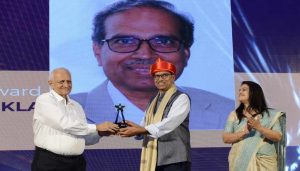Government to set up charging stations for electric vehicles alongside Mumbai – Pune road corridor
Dr. A. R. Sihag, Secretary, Ministry of Heavy Industries and Public Enterprises said here on Wednesday that the ministry has envisaged setting up of 300 electric charging stations in the country with special focus on highways in the country which includes the Delhi – Jaipur – Agra triangle and the Mumbai – Pune corridor, with a capital investment of Rs 35 crore. The initiative, a part of the Faster Adoption and Manufacturing of Hybrid and Electric Vehicles (FAME) – Phase 1, will be completed by the end of calendar 2019. Dr Sihag was speaking in the inaugural session of the 16th Symposium on International Automotive Technology (SIAT 2019) hosted by Automotive Research Association of India (ARAI) at Oxford Gold Resort at Bavdhan.
Rashmi Urdhwareshe, Director of ARAI, Vikram Kirloskar, President, ARAI, C.V. Raman, Vice President ARAI, Bala Bharadwaj, President, Society of Indian Automotive Engineers(SAE) India, Dr David Schutt, Chief Executive Officer of SAE International, Neeti Sarkar, CEO NATRiPand A. A. Badusha,convener of the symposium were present on the occasion.
Dr. Sihag told reporters on the sidelines of the session that the number of charging stations in the two road networks has not been finalized as yet. The implanting agency for the Mumbai – Pune section of the project, Rajasthan Electronics and Instruments Limited will engage with users of the road to decide the deployment of charging stations on Mumbai – Pune expressway.The installation of charging stations on Mumbai – Pune road corridor shall be completed by the end of 2019.
Earlier, in his address, Dr Sihag said that the Government is working as a facilitator to help accomplish India’s ” 3/12/65 vision” as stated in the Automotive Mission Plan 2016-26 by creating supportive infrastructure for testing, homologation and research and development for the industry. “The mission envisages to take the Indian automotive industry in the world’s top 3, increasing contribution of the industry to the country’s GDP to 12 percent and reach a landmark of employing 65 million in the industry.”
Dr Sihag said. Institutions such as ARAI should engage with private sector for R&D projects in new areas and the Government is willing to fund these projects, he added.
Vikram Kirloskar, President, ARAI said the Government can help the industry to bridge the gap between technology development and regulatory framework and create an enabling eco-system. The forthcoming changes such as the move to BS VI emission norms or crash sustaining standards has created many opportunities for new product development for the industry.
SAE India President Bala Bharadwaj said there should be an effort to expand the outlook towards the automotive industry because future vehicles will combine features of many equipment of mobility.
There are many parallels between the working of automobiles and airplanes and serious efforts to make flying automobiles are on, Bharadwaj – who is Managing Director of aerospace giant Boeing’s India Engineering & Technology Center. Dr Urdhwareshe, Directror, ARAI offered an overview of the three-day conference. C. V. Raman, vice president, ARAI, proposed the vote of thanks.
The conference will comprise technical sessions and seminars and is also running an expo where the latest in automotive technology and services is on display.







